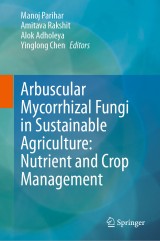Details
Arbuscular Mycorrhizal Fungi in Sustainable Agriculture: Nutrient and Crop Management
|
181,89 € |
|
| Verlag: | Springer |
| Format: | |
| Veröffentl.: | 03.06.2024 |
| ISBN/EAN: | 9789819703005 |
| Sprache: | englisch |
Dieses eBook enthält ein Wasserzeichen.
Beschreibungen
This 2 volume book is an up-to-date overview of current progress in Arbuscular Mycorrhizal Fungal (AMF) technique development, inoculum production and its quality regulations, application in agriculture, horticulture, agroforestry and other ecosystems along with nutrient management for sustainable food production. It offers new insight and cutting-edge information for novices and experts such as students, academicians, researchers, environmentalists, industrialists, and other individuals interested in the field of mycorrhiza.AMF provides favorable rhizospheric environment to the plant with numerous direct and indirect mechanisms, in exchange of soil nutrients and photosynthetically fixed carbon. Other than the species composition and diversity determination of natural ecosystem, AMF play a vital role in maintaining the soil quality, agricultural sustainability and environmental integrity. The second volume provide comprehensive knowledge on AMF role in nutrient cycling, nutrient exchange and their acquisition under normal and stress condition.<p></p>
Multifaceted role of AMF for sustainable agricultural production: an overview.- Molecular determinants and regulatory mechanism of nutrient exchange between plant and AMF.- AMF role in nutrient loss reduction and improvement in nutrient use efficiency.- Role of AMF in organic matter decomposition, carbon cycling and climate change.- Role of AMF in nitrogen and phosphorus cycling.- Application of AMF for the improvement in zinc and iron nutrition in agricultural crops.- Co-inoculation of AMF with other bio-fertilizers for better soil nutrients acquisition.- Application of AMF in production of cereal and oilseeds crops.- Application of AMF in production of pulse and legume crops.- The role of AMF in production of medicinal crops-The role of AMF in production of horticulture, and other high value crops.- Improvement in nutritional quality of food crops through AMF inoculation.- The abiotic stress management in agricultural crops through AMF technology.- Consortium of PGPR and mycorrhiza for improving agricultural productivity in degraded land.- Potential of AMF in bioremediation of heavy metals polluted soils.- Success story of AMF as a bio protectant against major plant pathogens.- Agronomic practices for optimizing the AMF abundance and diversity for sustainable food production.- Earthworm and Arbuscular mycorrhiza interactions: Strategies to augment productivity in agro-ecosystems.
<b>Dr. Manoj Parihar</b><p>Scientist, ICAR-Vivekananda Parvatiya Krishi Anusandhan Sansthan, India</p><p>Dr. Manoj Parihar is currently working at ICAR-VPKAS, Almora as a Soil Scientist in Crop Production Division. His present research works extend to study the diversity and distribution of AM fungi in North-Western Himalayan region, long term fertilizer assessment in the rainfed and irrigated soybean-wheat cropping system, soil health management under organic farming and various agroforestry systems.</p><p><b>Dr. Amitava Rakshit</b></p><p>Associate Professor, Department of Soil Science and Agricultural Chemistry, Institute of Agricultural Sciences, Banaras Hindu University (BHU), India</p>Dr. Amitava Rakshit research areas include: Nutrient use efficiency, Simulations modeling, organic farming, Integrated Nutrient Management and bioremediation.<p></p><p> </p><p><b>Dr. Alok Adholeya</b></p><p>Program Director, Sustainable Agriculture, IHC, TERI, India</p>Dr. Alok Adholeya hasover 35 years’ significant experience and expertise in the area of translational research and reaching out to millions of common people worldwide through his developed technologies which includes, a new biological organisms for soil fertility and crop productivity enhancement known as “Mycorrhizal” bioremediation of industrial solid waste aeron chemical and fertilizer industries, He has developed more than 25 IPR’s and commercialized most of them through technology transfer to industries. His current involvement in the area of nano intervention in agriculture, micro encapsulation technology developed for beneficial yet fragile microorganisms and seed coating technology are few which are making inroads to benefit mankind.<p></p><p><b>Dr</b><b>. Yinglong Chen</b></p><p>ARC Future Fellow, School of Agriculture and Environment, Institute of Agriculture, The University of Western Australia, Australia</p>Dr. Yinglong Chen research interests include the use of recently developed nondestructive imaging, isotope, and metabolism techniques to track rhizosphere interactions (root-soil-microbes, including mycorrhizal fungi) aiming to improve crop nutrient use efficiency and crop production.
This 2 volume book is an up-to-date overview of current progress in Arbuscular Mycorrhizal Fungal (AMF) technique development, inoculum production and its quality regulations, application in agriculture, horticulture, agroforestry and other ecosystems along with nutrient management for sustainable food production. It offers new insight and cutting-edge information for novices and experts such as students, academicians, researchers, environmentalists, industrialists, and other individuals interested in the field of mycorrhiza.AMF provides favorable rhizospheric environment to the plant with numerous direct and indirect mechanisms, in exchange of soil nutrients and photosynthetically fixed carbon. Other than the species composition and diversity determination of natural ecosystem, AMF play a vital role in maintaining the soil quality, agricultural sustainability and environmental integrity. The second volume provide comprehensive knowledge on AMF role in nutrient cycling, nutrient exchange and their acquisition under normal and stress condition.
Overviews AMF's role in nutrient cycling, exchange, and acquisition under normal and stressful conditions Provides recent advances and latest findings for deploying AMF as nutrient manager for sustainable food production Examine AMF’s role in improving the quality and nutraceutical properties of high-value crops
Diese Produkte könnten Sie auch interessieren:

Agricultural Biodiversity and Biotechnology in Economic Development

von: Joseph Cooper, Leslie Lipper, David Zilberman

213,99 €

Policy Reforms and Agriculture Development in Central Asia

von: Sandjar Djalalov, Suresh Chandra Babu

213,99 €

Regulating Agricultural Biotechnology

von: Richard E. Just, Julian M. Alston, David Zilberman

213,99 €














